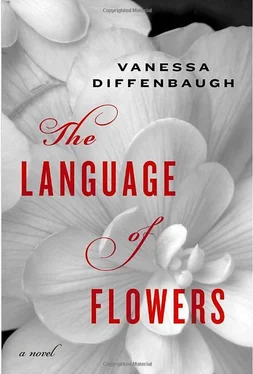Sitting on Elizabeth’s steps, I ate the pasta and tomatoes from my pockets and thought about whether I would look for the spoon. If I found it and gave it to Elizabeth, she might still make me sleep outside. Doing as I was told had never been a guarantee that I would get what I was promised. But I had glimpsed my room on the way downstairs, and it looked more comfortable than the splintering wood steps. I decided to try.
Slowly, I meandered through the garden until I came to the place I’d tossed the spoon. Kneeling under the almond tree, I felt around with my hands, thorns cutting my fingers as I reached through the thick brush. I parted tall stalks and pulled petals off thick shrubs. I tore leaves, broke branches. Still, I didn’t see it.
“Elizabeth!” I screamed, growing frustrated. The house was quiet.
The darkness was becoming thick, heavy. The vineyard seemed to stretch in all directions, an inescapable sea, and all at once I was terrified. With both hands I reached for the trunk of a dense bush, thorns piercing my soft palms as I pulled as hard as I could. The plant uprooted. I continued, pulling up everything I could grab, until the earth was bare. In the overturned soil the spoon lay alone, reflecting moonlight.
Wiping my bloody hands on my pants, I grabbed the spoon and ran toward the house, tripping and falling and picking myself up without ever letting go of my prize. I bounded up the steps, pounding the heavy metal spoon against the wooden door relentlessly. The lock turned, and Elizabeth stood before me.
For just a moment we looked at each other in silence—two pairs of wide, unblinking eyes—then I launched the spoon into the house with as much strength as I could gather in my thin arm. I aimed for the window over the kitchen sink. The spoon flew just inches past Elizabeth’s ear, arched high toward the ceiling, and bounced off the window before clattering into the porcelain sink. One of the small blue bottles teetered on the edge of the windowsill before it fell and shattered.
“There’s your spoon,” I said.
Elizabeth took a barely controlled breath before lunging at me. Her fingers dug into my lower rib cage, and she transported me to the kitchen sink, all but throwing me inside. My hip bones pressed against the tile countertop, and my face hovered so close to the shattered glass that for a moment the whole world was blue.
“That,” Elizabeth said, lowering my face even closer to the glass, “belonged to my mother.” She held me completely still, but I could feel the anger filling her fingertips, threatening my descent into the glass.
With a jerk she pulled me out of the sink and set me down, letting go before my feet touched the ground. I fell backward. She stood above me, and I waited for her hand to fall on my face. All it would take was one slap. Meredith would return before the mark could fade, and this final experiment would be over. I would be declared unadoptable, and Meredith would stop trying to find me a family; I was ready—past ready.
But Elizabeth dropped her hand and stood up straight. She took a step away from me.
“My mother,” she said, “would not have liked you.” She nudged me with her toe until I stood up. “Now get yourself upstairs and into bed.”
So , I thought, disappointed, this is not the end . My body filled with a palpable dread, heavy and overwhelming. It would end. I did not believe there to be even the slightest possibility that my placement at Elizabeth’s would be anything but short, and I wanted to have it over right then, before spending a single night in her home. I took a step toward her with my chin pushed forward in defiance, hoping my proximity would push her over the edge.
But the moment had passed. Elizabeth looked over my head, her breathing even.
With heavy steps I turned away. Pulling a slice of ham off the table, I climbed the stairs. The door to my room was open. I leaned for a moment in the empty frame, taking in all that would be temporarily mine: the dark wood furniture, the circular pink rag rug, and the desk lamp with a pearly stained-glass shade. Everything looked new: the puffy white eyelet comforter and matching curtains, the clothes hung in neat rows in the closet and folded into stacks in each dresser drawer. Crawling into bed, I nibbled the ham, salty and metallic-tasting from where my bleeding hands gripped. Between bites I paused to listen.
I had lived in thirty-two homes that I could remember, and the one thing they all had in common was noise: buses, brakes, the rumbling of a freight train passing. Inside: the warring of multiple televisions, the beeping of microwaves and bottle warmers, the doorbell ringing, a curse uttered, the snap of deadbolts turning. Then there were the sounds of the other children: babies crying, siblings screaming upon separation, the yelp of a too-cold shower, and the whimper of a roommate’s nightmare. But Elizabeth’s house was different. Like the vineyard settling in the dusk, inside the house was silent. Only a faint, high-pitched buzz traveled through the open window. It reminded me of the squeal of electricity on wires, but in the country I imagined it to come from something natural, a waterfall, maybe, or a band of bees.
Finally, I heard Elizabeth on the stairs. I pulled the covers over my head and around my ears so that I couldn’t hear her footsteps. Startling, I felt her sit lightly on the edge of my bed. I peeled the blanket an inch away from my ears but did not uncover my face.
“My mother didn’t like me , either,” Elizabeth whispered. Her tone was gentle, apologetic. I had an urge to peek out from underneath the covers; the voice that burrowed through the down was so different from the one that had held me over the sink that for a moment I didn’t think it belonged to Elizabeth.
“We have that much in common, at least.” Her hand rested on the small of my back when she said this, and I arched away from her, pushing my body into the wall that lined the side of the bed. My face pressed into the slab of ham. Elizabeth kept talking, telling me about the birth of her older sister, Catherine, and the seven years of stillbirths that followed: four babies total, all boys.
“When I was born, my mother asked the doctors to take me away. I don’t remember this, but my father told me it was my sister, only seven years old, who fed, bathed, and changed me, until I was old enough to do it myself.” Elizabeth continued to talk, describing her mother’s depression and her father’s devotion to her care. Even before she had learned to speak, Elizabeth told me, she had learned exactly where to place her feet as she tiptoed the hallways, to avoid the squeak of the old wood floors. Her mother didn’t like noise, any noise.
I listened as Elizabeth spoke. The emotion in her voice interested me—I had rarely been spoken to as if I was capable of understanding another’s experience. I swallowed a bite of meat. “It was my fault,” Elizabeth continued. “My mother’s illness. No one kept that a secret from me. My parents didn’t want a second daughter—girls weren’t believed to have the taste buds required to discern a ripe wine grape. But I proved them wrong.”
Elizabeth patted my back, and I could tell she had finished speaking. I took my last bite of ham. “How was that for a bedtime story?” she asked. Her voice was too loud in the quiet house, pretending an optimism I knew she did not feel.
Poking my nose out from underneath the covers, I took a breath. “Not great,” I said.
Elizabeth laughed once, a sharp exhale. “I believe you can prove everyone wrong, too, Victoria. Your behavior is a choice; it isn’t who you are.”
If Elizabeth really believed this, I thought, there was nothing but disappointment in her future.
Читать дальше












